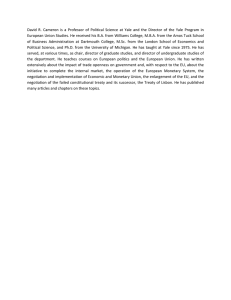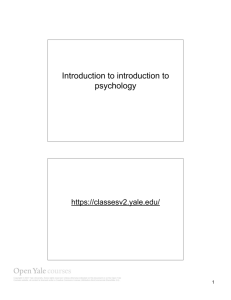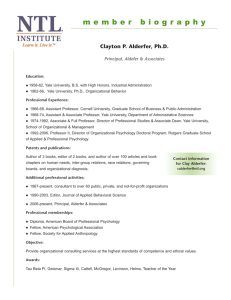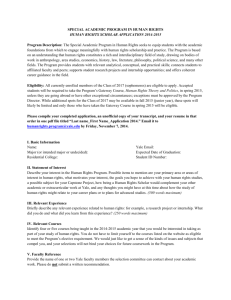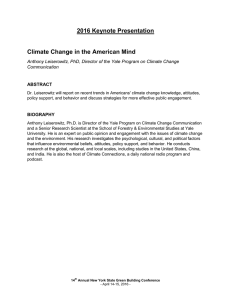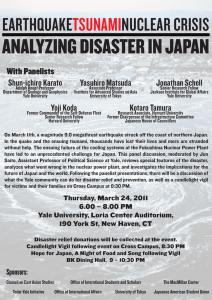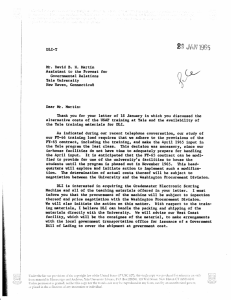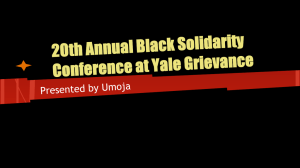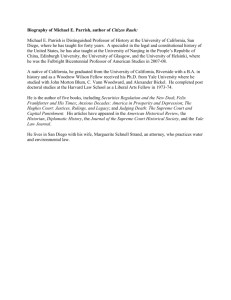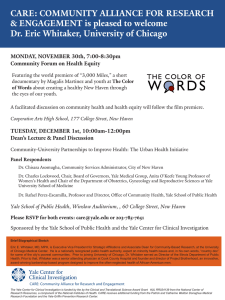career development office
advertisement
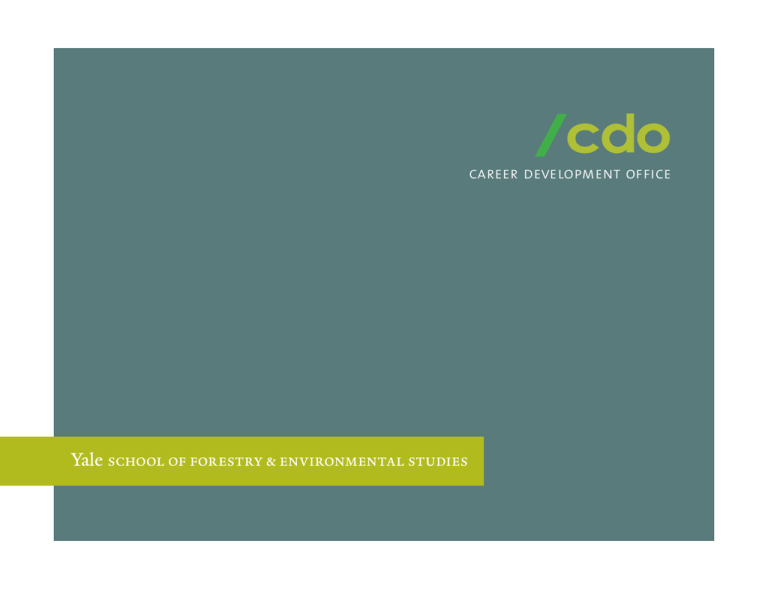
career development office Students returning from a field assignment at Yale-Myers Forest where they worked in teams to measure forest stand characteristics. Part of Introduction to Ecosystem Measurement, a required session that provides all of our graduates basic knowledge and tools to quantify natural resources and evaluate ecosystem data. yale school of forestry & environmental studies | career development “ When we see land as a community to which we belong, we may begin to use it with love and respect.” —aldo leopold, f&es alumnus, 1909 F ounded in 1900 by Yale alumni Henry Graves and Gi≠ord Pinchot, the first Chief of the U.S. Forest Service, Yale School of Forestry & Environmental Studies (F&ES) is the oldest professional forestry school in the nation. From many early U.S. Forest Service Chiefs to today’s global climate policy leaders, our graduates continue to work on a wide range of environmental challenges. Our extensive alumni presence spans the globe and cuts across major industries and employment sectors. With a strong commitment to the long-term health of the biosphere, the School prepares leaders with a systems-based education in eight broadly conceived 25– 30% 25–30 percent of our graduates are international areas of environmental concern—biodiversity, forestry, global climate, industry, law and economics, urban systems, water, and social ecology. environment.yale.edu/employers jena and heather Where’s the (Sustainable) Beef? “ What is sustainable beef? Is it a product, a process, an ethic? Is it a niche in the market? Or does it have to be the whole market?” –jena clarke, m.e.m. ’15 With a background in agricultural fund management with Macquarie Group and many years of hands-on work with cattle and other livestock in the U.S. and Australia, Jena is working towards expanding her reach into the policy arena. To better understand the intricacies of policy and how to help grow the sustainable beef industry, this summer she is exploring federal policy at the U.S. Department of the Interior, where she is working to create a private/public partnership to promote the conservation of another species—the sage grouse. Through a Summer Associate position with Beartooth Capital Partners, a private equity firm that focuses on investing in western U.S. ranches, and experience in impact investing including grass-fed beef strategy, Heather continues to build on her interest in rural economies and grasslands. At Yale she is working towards a career at the intersection of conservation finance and working lands management— completing both a Master of Forestry degree and a Master of Business Administration. To share their interests and expertise with the Yale community, Jena and Heather brought agricultural experts to Yale School of Forestry & Environmental Studies this year to address fundamental questions about the future of grasslands, ranching, and sustainable beef through a semester-long speaker series. Jena Clarke (left) Policy Intern, U.S. Department of Interior Master of Environmental Management ’15 Heather Carr West (right) Summer Associate, Beartooth Capital Partners Master of Forestry ’15, Master of Business Administration ’15 gao Elephant Conservation and Sustainable Trade When Gao came to Yale School of Forestry & Environmental Studies, he immediately noticed a lack of understanding of the ivory trade. In the unique position of studying wildlife conservation and policy sciences in the U.S. as a Chinese national familiar with the complex cultural, economic, and religious significance of ivory in China, Gao decided to focus his research on elephants and the ivory trade. photograph by robert sutcliffe/elephants without borders “The soaring slaughter of African elephants in recent years has received worldwide media and conservation attention. Yet, among the East, the West, and African societies, profound di≠erences exist in perspectives about the nature of the problem. If we are to build a broad and e≠ective coalition for elephant conservation, it is imperative to address the di≠erent views and disagreements in a way that clarifies and secures the common interest.” –gao yufang, master of environmental science ’14 Through fieldwork in Kenya, Tanzania, Botswana, Hong Kong, mainland China, and the United States, Gao conducted extensive research and completed a thesis mapping policy related to the international ivory trade. He continues his pursuit of securing the “common interest” to conserve the elephant, and is actively presenting his findings to the Chinese public, media, and conservation groups. To expand on his work at Yale, Gao is working on building a China-Africa conservation partnership with fellow conservationists in Africa. Gao Yufang Master of Environmental Science ’14 environment.yale.edu/employers zoraya Sustainable Industry in the Arab Region “ I focus on policies and market mechanisms that encourage sustainable provision of basic services still denied to communities across the globe.” —zoraya hightower, m.e.m. ’16 With a strong interest in integrated policy frameworks for water, energy, and waste management, Zoraya is completing an Arab Programme internship with the United Nations Industrial Development Organization (UNIDO) in Vienna. She is focusing on sustainable practices in the Middle East and North Africa. As a joint degree candidate in environmental management and international and development economics, Zoraya is uniquely positioned to understand the intersection of environmental sustainability and international policy and markets. Looking broadly at sustainable infrastructure, her work at UNIDO ranges from identifying the potential for leapfrogging new waste management systems in traditional landfills to feasibility studies on implementing clean coal technology. Zoraya Hightower Arab Programme Intern, United Nations Industrial Development Organization Vienna, Austria Master of Environmental Management ’16 Master of Arts in International and Development Economics ’16 yesenia Organic Food in Latino Communities Although a small number of consumer behavior studies have investigated the values and beliefs of organic shoppers, there remains a lack of qualitative studies on the values and beliefs of Latino consumers specifically. To address this gap, Yesenia is spending her summer in Portland, Oregon, trying to better understand how Latinas, who control the majority of Latino household spending, conceptualize the term “organic.” Based on her academic focus in urban food systems, Yesenia’s research also addresses, from a consumer marketing perspective, the most important qualities of organic produce in purchasing decisions for Latinas. “As the fastest-growing segment of U.S. population with an estimated $1.2 trillion dollars in purchasing power, Latinos represent a rich potential market for the organic industry.” —yesenia gallardo, m.e.m. ’15 What does “organic” mean to Latinos? What benefits do they perceive from having more organic food choices, if any? By better understanding conceptions and consumer behavior through qualitative research, Yesenia hopes to make a difference in the marketing, availability and consumption of healthy, organic food in urban Latino communities. Yesenia Gallardo Master of Environmental Management ’15 4 Our graduates have an average of four years of professional experience environment.yale.edu/employers anthony RFID Smart Tags in a Circular Economy “ What to do with clothing when we’re done with it is a complicated challenge. Using new information technology to give apparel a new life is an intriguing opportunity both environmentally and commercially.” –reid lifset, associate director of the industrial environmental management program, yale school of forestry & environmental studies With an academic focus on both environmental management and business administration, Anthony has combined the rigor of energy and material flow analysis with design thinking and competitive strategy. As a Schmidt-MacArthur Circular Economy Fellow, Anthony and his mentor, Reid Lifset, developed a Circular Economy Innovation Project— meant to advance thinking around resource e∞ciency and regenerative business models. Anthony explored radio frequency identification (RFID) smart tagging in the apparel sector—a technology designed to improve e∞ciency of manufacturing, distribution, and retailing as well as to unlock new functionality for consumers, end users and recyclers. His task? Identify the benefits and risks up and down the supply chain. While RFID technology is already transforming some businesses through improved tracking and operational e∞ciency, extending tagging to the item level has been implemented in only a few industries. It offers both new opportunities and new challenges related to environmental management, technology, and privacy. To explore these questions, Anthony connected with large apparel manufacturers and retailers, RFID manufacturers and strategists, and leading recycling companies to develop models for aligning interests in a next generation RFID-enabled business model. 36 Students come from 36 Countries Anthony Clark Master of Environmental Management ’14 Master of Business Administration ’14 cary and caitlin New Haven’s Green Infrastructure An active volunteer for community-based sustainability projects and professional urban planner and designer, Cary brings both strong interest and a depth of experience to the development and implementation of green infrastructure. “Green infrastructure is the wave of the future. That’s how any city that’s interested in sustaining itself and its public health over time has to view its urban planning.” — bram gunther, m.e.m. ’91, chief of forestry, horticulture natural resources group, new york city parks department As a professional engineer with a background in municipal water management, Caitlin has actively initiated green infrastructure projects at F&ES. She wrote the first Sustainable Stormwater Management Plan for Yale, and completed a fellowship focused on green infrastructure with District of Columbia Water and Sewer Authority’s Clean Rivers Project. The fellowship was supported by the Hixon Center for Urban Ecology. To mitigate rainwater entering city sewers and the subsequent overflow of polluted water into the Long Island Sound, the City of New Haven and Yale University are actively pursuing green infrastructure solutions —providing the perfect lab for Cary and Caitlin. Bringing their expertise to this opportunity to test new ideas, their work has ranged from research on green infrastructure systems to developing community outreach strategies for the City of New Haven. Based on their recommendations, the city has scheduled construction of a series of bioswales—natural structures that sequester stormwater, filter pollutants and slow the surge into existing runo≠ collectors. The team has also designed a rain garden for F&ES. With a basin, or berm, to collect rainwater, it will consist of hardy shrubs that tolerate both flood and drought—including sweet fern, red twigged dogwood, and black chokeberry. The rain garden will serve as an educational tool as well as provide important data regarding e∞cacy of future rain gardens. Cary Simmons, LEED A.P. Master of Environmental Management ’14 Caitlin Feehan, P.E., LEED A.P Master of Environmental Management ’14 42 Students come from 42 States environment.yale.edu/employers “ We provide a broadly based learning experience that equips our graduates to assume influential roles in government, business, nongovernmental organizations, public and international affairs, journalism, research, and education.” – peter r. crane, carl w. knobloch jr. dean yale school of forestry & environmental studies 10% Approximately 10 percent enroll in a joint MEM*/MBA degree with the Yale School of Management *MASTER OF ENVIRONMENTAL MANAGEMENT Students taking a photo break on a field trip to Horse Island during Urban Ecosystems, a required session designed to provide all graduates with the ability to analyze how the actions of humans and the built environment alter ecosystem structure and function. yale school of forestry & environmental studies | career development Our graduates lead nationally and internationally in traditional and emerging environment-related areas including: • Green Infrastructure • Water Resources Management • Sustainable Land Management and Land-Use Planning • Energy Analysis and Strategy • Ecosystem and Wildlife Conservation • Biofuels Research • Corporate Sustainability Students participating in a 2-day simulation of UN Conference of Parties talks. • Environmental Policy Analysis • Green Building • Environmental Engineering • Brownfield Remediation • Industrial Ecology • Forestry • Urban Planning and Design • Environmental Education and Training • Protected Areas Management • Resilient Local Food Systems • Environmental Health and Safety • Industrial Recycling • Carbon and Forest Finance • Air Quality Management • International Development • Waste Management • Green Manufacturing • Social Ecology • Environmental Investing • Disaster Risk Management • Energy E≤ciency • Renewable Energy Development • Climate Change Mitigation and Adaptation • Green Chemistry • Environmental Law environment.yale.edu/employers SELECTED FIRST JOBS FOR RECENT ALUMNI Global Policy Fellow natural resources defense council Technical Advisor united states business council for sustainable development International Development Fellow catholic relief services Project Coordinator shanshui conservation center, china Corporate Development Manager apex wind energy Forest Policy Research Consultant food and agriculture organization of the united nations (fao) Energy Analyst california public utilities commission Operations Analyst climate change adaptation, world bank group Senior Associate pricewaterhousecoopers Business Associate nextera energy resources Program O≤cer intergovernmental panel on climate change, japan Princi- pal Industry Analyst google Associate industrial economics Bristol Bay Protection Writer world wildlife fund Environmental Designer atelier ten Research Associate for National Policy Team environmental defense fund Senior Research Associate lawrence berkeley national laboratory Sustainability and Agriculture Supply Chain Specialist pepsico Senior Manager connecticut clean energy finance & investment authority Congressional Affairs Fellow national oceanic and atmospheric administration Senior Energy Analyst navigant Environmental Program Manager apple Volcanic Chain Program Manager the nature conservancy, guatemala Zone Fuels Planner u.s.d.a. forest service Carbon Finance O≤cer united nations development programme, peru Associate Environmental Planner icf consulting Environment, Health and Safety Associate international paper yale school of forestry & environmental studies | career development 10% Approximately 10 percent complete a Master of Forestry degree Students and graduates in Chicago during training for the Environmental Defense Fund’s Climate Corps program. The fellowship provides graduate students the opportunity to develop a business case for energy e≤ciency in public and private sector host organizations. photo courtesy of edf environment.yale.edu/employers “ The economy of nature and the ecology of man are inseparable.” —spencer beebe f&es alumnus, 1974 Laura Huober, M.E.M. /M.B.A. ’16, measuring a tree in Yale-Myers Forest during Introduction to Ecosystem Measurement. ALL All graduates learn how to measure a stand of trees, even if their focus is corporate responsibility, green architecture, or international policy HIRE OUR STUDENTS AND ALUMNI These are just some of the ways to get involved in recruiting at F&ES! Recruiting Contacts Ladd Flock, Director t: (203) 432-8920 e: ladd.flock@yale.edu Alyssa Student, Assistant Director t: (203) 436-9631 e: alyssa.student@yale.edu 1 Create a Free Account in • Post a position for current students, recent graduates, and alumni • Search and review our student database and résumés • Register for on- or off-campus recruiting opportunities 2 Participate 3 • • • • in a Recruiting Event On-Campus Recruiting Weeks for full-time jobs and internships Industry Networking Nights Duke-Yale Environmental Career Fair, Washington, D.C. All-Ivy Environmental and Sustainable Development Fair, NYC Get Involved in Our Master’s Internship/Research Project Program • A summer internship or research project is required for all F&ES master’s degree candidates • Work with us to bring well-qualified students to your organization environment.yale.edu/employers career development office For more information, visit our Website at environment.yale.edu/employers or contact: Ladd Flock, Director of Career Development t: 203.432.8920 e: ladd.flock@yale.edu Kathryn Douglas, Associate Director of Career Development t: 203.436.4830 e: kathryn.douglas@yale.edu Alyssa Student, Assistant Director of Career Development t: 203.436.9631 e: alyssa.student@yale.edu except where noted, photography by: sarah gordon and danielle lehle Hire the World’s Future Environmental Leaders! environment.yale.edu/employers
